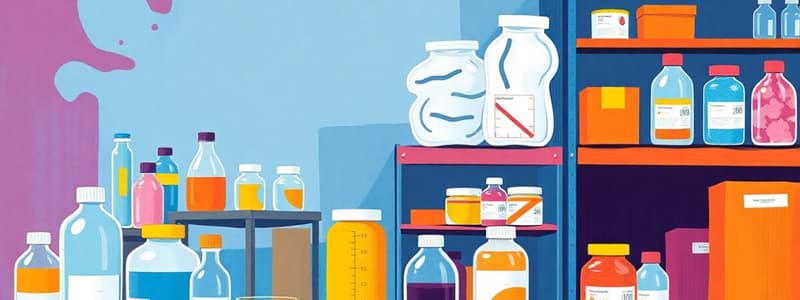Podcast
Questions and Answers
What is the main focus of Quality Assurance (QA)?
What is the main focus of Quality Assurance (QA)?
- Evaluating individual technician performance.
- Improving the processes involved. (correct)
- Ensuring the product meets standards.
- Reactively addressing quality failures.
Which of the following is a primary characteristic of Quality Control (QC)?
Which of the following is a primary characteristic of Quality Control (QC)?
- Evaluates product quality after delivery. (correct)
- Focuses on patient satisfaction.
- Proactively prevents issues.
- Involves setting performance objectives.
How does Management by Objectives (MBO) relate to quality in healthcare?
How does Management by Objectives (MBO) relate to quality in healthcare?
- It sets performance objectives to measure service delivery. (correct)
- It replaces Quality Assurance processes entirely.
- It establishes procedures to evaluate patient outcomes.
- It is solely focused on individual technician outputs.
What major indicator reflects the quality of service in healthcare according to the 1995 JCAHO standards?
What major indicator reflects the quality of service in healthcare according to the 1995 JCAHO standards?
What is a critical aspect often overlooked by the QA model in assessing quality?
What is a critical aspect often overlooked by the QA model in assessing quality?
Which statistical method is crucial in the application of Quality Control?
Which statistical method is crucial in the application of Quality Control?
Why is it important to document improvement as part of the quality evaluation process?
Why is it important to document improvement as part of the quality evaluation process?
What is a disadvantage of the traditional QC model in quality management?
What is a disadvantage of the traditional QC model in quality management?
What principle should replace dependence on inspection to enhance quality in an organization?
What principle should replace dependence on inspection to enhance quality in an organization?
Which approach is recommended to reduce costs in sourcing for quality improvement?
Which approach is recommended to reduce costs in sourcing for quality improvement?
Which of the following is NOT one of Deming's 7 deadly diseases of management?
Which of the following is NOT one of Deming's 7 deadly diseases of management?
Which statistical measurement is commonly used for quality assessment in laboratory settings?
Which statistical measurement is commonly used for quality assessment in laboratory settings?
Which method is suggested to improve leadership within an organization?
Which method is suggested to improve leadership within an organization?
What is the purpose of removing annual ratings or the merit system from employee evaluations?
What is the purpose of removing annual ratings or the merit system from employee evaluations?
What does the coefficient of variance (CV) measure in quality control?
What does the coefficient of variance (CV) measure in quality control?
Which principle emphasizes the continuous involvement of all workers in transformation processes?
Which principle emphasizes the continuous involvement of all workers in transformation processes?
What does the shape of the gaussian distribution curve reveal about data problems?
What does the shape of the gaussian distribution curve reveal about data problems?
What is the main purpose of proficiency surveys in external quality assessment programs?
What is the main purpose of proficiency surveys in external quality assessment programs?
Which of the following best describes the effect of skewed curves on data interpretation?
Which of the following best describes the effect of skewed curves on data interpretation?
What type of errors can lead to flawed data in statistical evaluations?
What type of errors can lead to flawed data in statistical evaluations?
Which aspects are typically part of hospital quality assurance programs?
Which aspects are typically part of hospital quality assurance programs?
How can control charts like Levey-Jennings help in quality evaluation?
How can control charts like Levey-Jennings help in quality evaluation?
What are the two main types of external quality assessment programs?
What are the two main types of external quality assessment programs?
What can happen if problems in data sampling or processes are not rectified?
What can happen if problems in data sampling or processes are not rectified?
Flashcards
Deming's 7 Deadly Diseases
Deming's 7 Deadly Diseases
Seven management practices that hinder quality improvement.
Lack of constancy of purpose
Lack of constancy of purpose
Changing goals or priorities frequently.
Emphasis on short-term profits
Emphasis on short-term profits
Focusing on immediate gains over long-term success.
Evaluation by performance, merit rating, or annual review of performance
Evaluation by performance, merit rating, or annual review of performance
Signup and view all the flashcards
Basic Quality Control Statistics
Basic Quality Control Statistics
Signup and view all the flashcards
Mean (x̄)
Mean (x̄)
Signup and view all the flashcards
Coefficient of Variation (CV)
Coefficient of Variation (CV)
Signup and view all the flashcards
Standard Deviation (SD)
Standard Deviation (SD)
Signup and view all the flashcards
Quality assurance (QA)
Quality assurance (QA)
Signup and view all the flashcards
Quality control (QC)
Quality control (QC)
Signup and view all the flashcards
Management by objectives (MBO)
Management by objectives (MBO)
Signup and view all the flashcards
What is the difference between Quality Control (QC) and Quality Assurance (QA)?
What is the difference between Quality Control (QC) and Quality Assurance (QA)?
Signup and view all the flashcards
How does the JCAHO standard relate to QC and MBO?
How does the JCAHO standard relate to QC and MBO?
Signup and view all the flashcards
Why is patient care the true indicator of quality service?
Why is patient care the true indicator of quality service?
Signup and view all the flashcards
What is the major contribution of QA?
What is the major contribution of QA?
Signup and view all the flashcards
What is the limitation of the QA model?
What is the limitation of the QA model?
Signup and view all the flashcards
Control Charts
Control Charts
Signup and view all the flashcards
Skewed Curves
Skewed Curves
Signup and view all the flashcards
Proficiency Surveys
Proficiency Surveys
Signup and view all the flashcards
Licensure and Accreditation Programs
Licensure and Accreditation Programs
Signup and view all the flashcards
What are the two types of external quality assessment programs?
What are the two types of external quality assessment programs?
Signup and view all the flashcards
What can skewed curves indicate about data?
What can skewed curves indicate about data?
Signup and view all the flashcards
Why are control charts important in quality control?
Why are control charts important in quality control?
Signup and view all the flashcards
What is the difference between Proficiency Surveys and Accreditation/Licensure Programs?
What is the difference between Proficiency Surveys and Accreditation/Licensure Programs?
Signup and view all the flashcards
Study Notes
Material Management
- Supplies are the second largest laboratory expense, after labor.
- Material management is a system for acquiring and using supplies efficiently.
- A centralized material management department is divided into purchasing and stockroom sections.
- Purchasing handles vendor orders and invoices.
- Stockroom manages inventory levels and distribution.
- Key material management goals include timely supply delivery, minimizing spoilage, avoiding backorders, maximizing storage space utilization, and minimizing financial investment in inventory.
Goals of Material Management
- Supplies arrive on time.
- Spoilage is minimized
- Backorders and delays are avoided.
- Storage space is used effectively.
- The most economically advantageous price is obtained.
- Financial resources are not tied up in inventory.
Supplies
- Supplies are products meeting specific time and price criteria.
- Items consumed within a year or with a shelf life under a year (e.g., reagents, rapid tests) are considered supplies.
- Items costing under $1000 are considered supplies, even if used for several years (e.g., micropipettes).
Capital Items
- Items exceeding the criteria for supplies are capital items (e.g., laboratory analyzers).
Purchasing Documents
- Request for Purchase - an interim document initiating the ordering process.
- Purchase Order - a formal order committing the organization to purchase.
- Traveling Requisition - a catalog of stocked products for departmental requests; tracked and charged to individual departments monthly.
Standing Orders
- Standing orders are for frequently ordered items with predictable usage or short shelf lives.
- Vendors deliver products in accordance with predefined schedules.
- This streamlines ordering and reduces lead times.
- The advantage is timely delivery, bulk discounts, efficient vendor management of inventory.
Inventory Management
- Perpetual system - tracks inventory each time a product is issued or received.
- Periodic system - counts and orders at specified times.
- Random checks - confirm perpetual system accuracy.
Inventory Management Tools
- Economic Order Quantity (EOQ) - the optimal quantity to order at one time.
- Economic Ordering Point (EOP) - the point at which inventory should be reordered to prevent shortage.
- Optimal Reorder Time (ROT) - the ideal time to place an order to utilize EOQ and EOP benefits.
Quality Assessment and Performance Improvement
- Quality Control (QC) evaluates specific components of quality in products and services.
- Quality Assurance (QA) assesses the entire organization's quality.
- QA focuses on outcomes (patient care).
- QC focuses on products.
- Management by Objectives (MBO) established performance goals and then metrics.
- Total Quality Management (TQM) satisfies customers' needs.
- Continuous Quality Improvement (CQI) continuously monitors and improves quality.
Quality Assessment and Improvement (QA&I)
- Defining "quality" is difficult and evolving.
- Historically, quality assessment encompassed statistical tools that evaluated products (QC) and the entire organization's quality (QA).
- QA&I incorporates both concepts-quality improvement is a continuous process.
Safety Management and Workplace Hazards
- Individual worker responsibility for safety and following established workplace safety procedures is crucial.
- Employers are responsible for creating clear safety policies, providing employee safety training, and providing adequate equipment and facilities.
- Employee compliance with company safety policies is essential.
- Structural separations may be necessary to prevent cross-contamination between different tasks/activities and hazardous materials.
- Proper fire prevention is essential- including careful handling of flammables, readily available fire extinguishers, and designated evacuation procedures.
- Electrical safety measures, proper personal protective equipment and disposal procedures need to be addressed and strictly adhered to.
- Emergency procedures, including first aid supplies, access to safety personnel and appropriate communication networks are crucial in case of accidents.
Studying That Suits You
Use AI to generate personalized quizzes and flashcards to suit your learning preferences.



